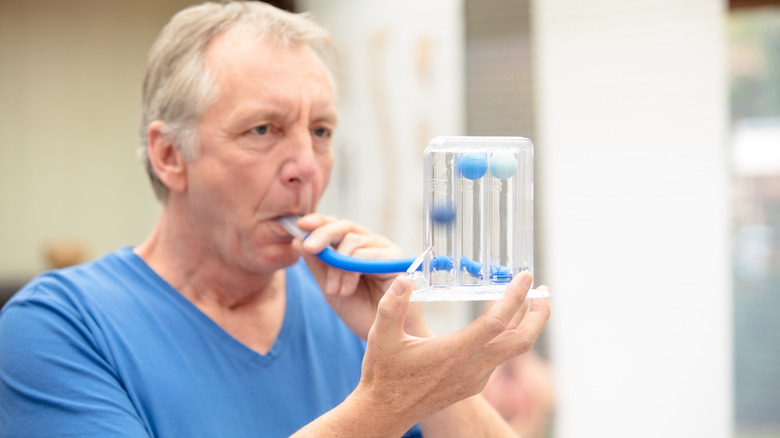What It Means When You Cough Up Mucus
During your recent shopping trip, you noticed a tickle in your throat. It was a full-on cough with a bit of mucus by the night's end. Coughing up mucus can give anyone a bit of worry since it is linked to different conditions. For example, too much mucus in your throat and coughing it up can be a symptom of conditions like respiratory infection, allergies, asthma, lung diseases, and GERD. It can also be caused by smoking.
Before looking at what might be causing your cough, it's vital to understand that most of the time coughing up clear or white mucus is nothing to worry about. Dr. Richard Boucher, a lung expert at the University of North Carolina, told News in Health, "People think about it as something you're supposed to cough up and get out. That it's a bad thing. But in truth, mucus really is the interface between you and the outside world." The purpose of mucus is to line your nasal and airway passages to keep everything lubricated and help filter out allergens, bacteria, and irritants so they can't find their way into your lungs and wreak havoc.
Now that you understand why we produce mucus, let us take you through the symptoms that can occur alongside it when you have various health conditions. We'll also discuss how these conditions are treated.
Mucus is a symptom of a respiratory infection
According to the NHS, respiratory infections affect the throat, sinuses, lungs, and airways and can include symptoms like cough with yellow, green, or brown phlegm; sneezing; stuffy nose; sore throat; headaches; fever; body aches; wheezing; and malaise.
The specific symptoms you experience depend on the cause. For example, the common cold is caused by a virus. Its symptoms include a runny nose, cough with yellow or green mucus, and headache. However, it typically does not cause a high fever, per Keck Medicine of USC. Pneumonia can be caused by bacteria and it can have symptoms like fatigue, wheezing, chest pain, cough with thick yellow or brown mucus, high fever, and nausea. Other common conditions under the respiratory tract umbrella include flu, bronchitis, sinusitis, bronchiolitis, chest infection, and pneumonia, per Cleveland Clinic.
The course of treatment for your phlegmy cough and feeling unwell comes down to what's causing it. Severe viral infections might be treated with an antiviral if caught early enough; but, typically, rest, fluids, and over-the-counter pain meds are the true heroes. Bacterial infections cause more severe symptoms and require a course of antibiotics in addition to rest and fluids.
Mucous can also mean you have an allergy
If you have seasonal allergies or are allergic to dust or pet dander, your phlegm could be related to your allergies. According to the Mayo Clinic, allergies happen when your immune system gets a little overzealous in response to an allergen like pollen, mold, perfumes, cigarette smoke, etc. While the allergen isn't harmful, your body treats it as if it is, leading to inflammation in your sinuses or airways. Allergic rhinitis, also called "hay fever," has symptoms ranging from sneezing and watery eyes to a runny nose and cough.
The cough from allergies comes every time you encounter the allergen, which can lead to a chronic cough (allergy cough). The postnasal drip from continuously encountering the allergen leads to mucus buildup in your throat and a productive cough with clear mucus. Penn Medicine also notes that an allergy cough typically lasts several weeks. The American College of Allergy, Asthma, & Immunology (ACAAI) states that between 40 million and 60 million people suffer from hay fever and possibly an allergy cough.
Treatment for an allergy cough requires a visit to an allergist or healthcare specialist to find out the trigger of the cough. Prescription medication or over-the-counter antihistamines are prescribed, along with avoiding outdoor and indoor allergens as needed. For example, ACAAI recommends keeping the windows shut during high pollen, using an air purifier, and washing hands after petting animals to limit exposure to allergens. It can also be beneficial to mite-proof bedrooms and frequently wash bedding.
Coughing up mucus is linked to asthma
Asthma is a long-term condition with an array of symptoms. You can experience wheezing, chest tightness, and breathlessness. It can also come with a cough and mucus.
According to NHS, asthma is an inflammation of the bronchi, the tubes that are responsible for carrying air in and out. When a trigger hits, the airway closes, leading to tightness. It also causes you to produce phlegm. Typically, the phlegm from asthma is white or clear and you have a cough now and then. However, as your asthma worsens or you encounter a trigger, like allergens or chemicals, you'll cough up more phlegm. Asthma + Lung UK also clarifies that coughing more could be a sign the condition is worsening and requires a trip to your healthcare provider. The publication also notes that mucus can move from your lungs into your nose and sinuses, furthering the irritation of your respiratory system.
A cough with mucus from asthma is normal. However, Medical News Today states if you notice a change in your mucus from clear or white to yellow, then you should visit your healthcare professional. It could indicate an infection, which can worsen asthma symptoms, making it dangerous. Watch for other symptoms as well, like tiredness or a fever. It's essential to continue taking your medications and using your inhaler if you suspect you have an infection.
Cough and mucus can indicate certain lung diseases
If you're coughing up mucus regularly, a lung disease might be causing your issue, according to the American Lung Association (ALA). This is especially true if you have discolored (yellow, green, or brown) mucus without infection.
One of the most common lung diseases is chronic obstructive pulmonary disease (COPD), which encompasses chronic bronchitis and emphysema. With this condition, your bronchial tubes or alveoli have damage, leading to mucus buildup and difficulty breathing. COPD is a chronic disorder that gets worse with time. According to Cleveland Clinic, 15 million people were diagnosed with COPD in 2020. "Many people living with COPD, especially those who smoke and may not have yet been diagnosed with COPD, develop progressively more cough and mucus and initially discount it as 'normal, smoker's cough,'" Irina Petrache, M.D., told ALA.
Other lung diseases include cystic fibrosis, nontuberculous mycobacteria (NTM) lung disease, and lung cancer. Cystic fibrosis is a genetic disorder that causes blocked airways and lung damage, per the Centers for Disease Control and Prevention. They note that it affects 35,000 people in the U.S. NTM is due to a bacteria found in soil and water worldwide and affects more than 86,000 people in the U.S. Symptoms include a chronic cough and fever (via ALA). Lung cancer features a new or worsening cough and coughing up mucus with blood. Many patients also experience recurrent lung infections, per Cancer Research UK. Treatment for lung diseases varies based on the cause.
GERD cough can come with mucus
Heartburn, nausea, and throat irritation are the typical symptoms of gastroesophageal reflux disease (GERD). This disease is caused by stomach acids backing up into the esophagus, causing damage to the delicate tissues. Medical News Today notes that the condition can result from a weak valve separating the stomach from the esophagus. Other factors include medications, eating a fatty diet, pregnancy, and diabetes. However, the damage goes beyond just the stomach lining, causing issues with the pulmonary system and leading to a chronic cough.
GERD cough can be chronic or occasional, and other symptoms include wheezing, hoarseness, sore throat, difficulty swallowing, and chest congestion, according to GI Associates. Research in the Annals of Thoracic Medicine also noted constant throat irritation and postnasal drip can lead to lung inflammation, which can cause asthma, bronchitis, and pneumonia. The publication also states that GERD was associated with COPD and obstructive sleep apnea syndrome.
Treatment is essential to deal with GERD cough. Lifestyle changes like quitting smoking, eating healthy, avoiding GERD triggers, and getting regular exercise can help to reduce symptoms. Your healthcare provider might also recommend antacids, histamine blockers, or proton pump inhibitors. Surgery for GERD could be used to reinforce the lower sphincter in your esophagus, per Mayo Clinic.
Mucus cough is common among smokers
Coughs can go beyond just medical conditions. Sometimes, it's environmental factors, like smoking, causing you to cough up mucus. Smoking introduces chemicals into your system. One of the main ingredients in cigarettes is nicotine, which is a stimulant drug, according to the Alcohol and Drug Foundation. However, it's also combined with tar and carbon monoxide gas. These different chemicals affect the cilia, tiny hair structures within the airways, meaning you lose some of the ability to remove toxins from your lungs (via Healthline).
Smokers also have an increase in postnasal drip, which leaks into the throat, leading to more mucus and phlegm. Therefore, a smoker's cough sounds wetter and more productive. The cilia become responsive again after a few hours without smoking, making the smoker's cough worse in the morning. The duration of the smoker's cough depends on how long you smoke. It can last a few days with a cigarette or two, or it can be indefinitely for consistent smokers.
Ridding yourself of a smoker's cough requires you to quit smoking. However, there are specific things you can do to help alleviate the symptoms. Gargling with salt or using lozenges can soothe the throat; it's also beneficial to stay hydrated to keep your mucus thin. Getting regular exercise and sleeping with your head elevated is also helpful, per Medical News Today. You can also add steam or a humidifier to your home to moisturize the air.







